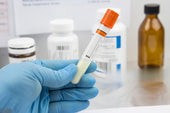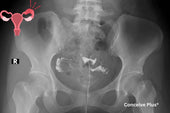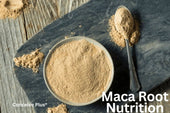How to Increase Cervical Mucus for Improved Fertility?

Cervical mucus is a natural fluid made by the glands present around your cervix. This fluid helps maintain a balanced vaginal environment and inhibits the entry of harmful agents into the female reproductive tract, protecting the female reproductive tract from infections [1].
The consistency of cervical mucus changes throughout your menstrual cycle. Around your period, it is usually thick and sticky. When you get close to ovulation, it becomes thin, clear, and stretchy. These changes in cervical mucus are a normal part of the female reproductive cycle and contribute to conception.
However, different factors can stop or slow the production of cervical mucus, posing a significant risk to female reproductive health and fertility. In such a case, females wonder how to increase cervical mucus.
How Does Cervical Mucus Support Conception?
Thin and stretchy cervical mucus around ovulation is very helpful for conception. When the mucus is watery and clear near ovulation, it facilitates the transport of sperm into the uterus [2].
Sperm can swim easily through this less viscous and stretchy fluid. The mucus also helps protect the sperm from the acidic environment of the vagina. This means more healthy sperm can reach your egg, increasing your chance of getting pregnant.
When Cervical Mucus Can Inhibit Conception?
The cervical mucus is not always favorable for transporting sperm. For example, when the mucus is thick and sticky, on days other than ovulation, it can act like a barrier. Thick mucus makes it hard for sperm to move freely and reach inside the uterus.
This type of mucus is common after ovulation and before your period. In this phase, the mucus helps prevent sperm from entering the uterus. That is why timing is very important if you are trying to conceive. Also, this thick nature of mucus prevents the entry of harmful bacteria and supports reproductive health [1].
If you notice egg white cervical mucus but no LH surge during your cycle, be sure to check out our article 'Egg White Cervical Mucus but No LH Surge: What It Indicates' for expert insights into what this might mean for your fertility.
Factors Impacting Cervical Mucus
Many factors can impact the quantity and consistency of the cervical mucus your body produces. Hormonal balance is among the primary factors that directly influence cervical mucus. High estrogen levels around ovulation help create thin, slippery mucus [3]. Low estrogen, on the other hand, may result in thick, viscous mucus.
Other factors that can influence cervical mucus include:
- Hydration: Staying hydrated by drinking plenty of water helps thin cervical mucus, making it easier for sperm to travel and potentially assisting in conception. On the other hand, dehydration can lead to thicker, less fertile mucus.
- Medications: Some medications, like certain birth control pills or antihistamines, can change your cervical mucus. They may make it thicker, which can affect how easily sperm can move.
- Health Conditions: Conditions like thyroid problems or polycystic ovary syndrome (PCOS) can impact hormone balance, which is directly associated with the composition and consistency of cervical mucus.
- Lifestyle: Lifestyle factors such as hydration, diet, and stress levels can change the quality and amount of cervical mucus. A healthy diet, plenty of water, and low stress help maintain thin, stretchy mucus, which supports sperm travel. Smoking and heavy alcohol use can harm the composition of cervical mucus, making it harder for sperm to move.
Natural Ways to Increase Cervical Mucus
If you are wondering how to increase cervical mucus naturally, plenty of effective tips can help. These include:
-
Stay Hydrated
Drinking plenty of water is one of the simplest ways to boost cervical mucus production. Water helps your body stay hydrated and supports the natural production of cervical mucus.
-
Eat a Balanced Diet
Foods rich in essential fatty acids, like fish, nuts, and seeds, may help improve mucus quality. A diet high in vitamins — especially vitamin E — can support healthy hormone levels and mucus production.
-
Consider Natural Supplements
Some women find that herbal supplements such as evening primrose oil or red raspberry leaf tea help increase cervical mucus [4]. However, such supplements may not suit everyone, so it is essential to consult with your doctor first.
-
Healthy Lifestyle Choices
Avoid smoking and limit alcohol intake to improve cervical mucus health and overall fertility [5]. These choices can help maintain a balanced hormonal environment and support your reproductive health.
-
Use Fertility-Friendly Lubricants
When choosing lubricants during intercourse, go for fertility-friendly lubricants, as they mimic natural cervical mucus or vaginal environment. These lubricants are usually water-based and free of harsh chemicals. They help maintain a healthy environment that supports sperm travel and, as a result, conception.
If you’re curious about other unusual reproductive signs like mucus in urine pregnancy, be sure to check out our article 'Mucus in Urine Pregnancy: What Does It Mean?' for further insights.
The Bottom Line
Cervical mucus is not just a protective fluid around your cervix, but it also contributes to your fertility. Its texture changes throughout your menstrual cycle, depending on the requirements of the body.
When the mucus is thin and stretchy near ovulation, it creates a perfect pathway for sperm. But when it becomes thick, it stops sperm from passing through, which is normal during phases of your cycle other than ovulation.
Women, after experiencing decreased cervical mucus, often wonder how to increase cervical mucus. By staying well-hydrated, eating a balanced diet, managing stress, and using natural supplements if needed, you can help support the production of healthy cervical mucus.
Resources Used
- Hansen, L. K., Becher, N., Bastholm, S., Glavind, J., Ramsing, M., Kim, C. J., Romero, R., Jensen, J. S., & Uldbjerg, N. (2013b). The cervical mucus plug inhibits, but does not block, the passage of ascending bacteria from the vagina during pregnancy. Acta Obstetricia Et Gynecologica Scandinavica, 93(1), 102–108. https://doi.org/10.1111/aogs.12296
- Professional, C. C. M. (2025c, February 12). Cervical mucus. Cleveland Clinic. https://my.clevelandclinic.org/health/body/21957-cervical-mucus
- Professional, C. C. M. (2025d, February 18). Estrogen. Cleveland Clinic. https://my.clevelandclinic.org/health/body/22353-estrogen
- Ghanaei, M. M., Asgharnia, M., Farokhfar, M., Ghalebin, S. M. A., Rafiei, E., & Haryalchi, K. (2022). The effect of consuming evening primrose oil on cervical preparation before hysteroscopy: An RCT. International Journal of Reproductive BioMedicine (IJRM), 591–600. https://doi.org/10.18502/ijrm.v20i7.11561
- De Angelis, C., Nardone, A., Garifalos, F., Pivonello, C., Sansone, A., Conforti, A., Di Dato, C., Sirico, F., Alviggi, C., Isidori, A., Colao, A., & Pivonello, R. (2020). Smoke, alcohol and drug addiction and female fertility. Reproductive Biology and Endocrinology, 18(1). https://doi.org/10.1186/s12958-020-0567-7
































